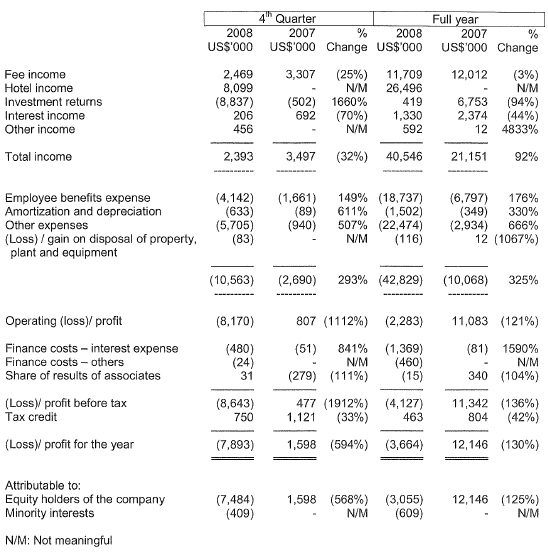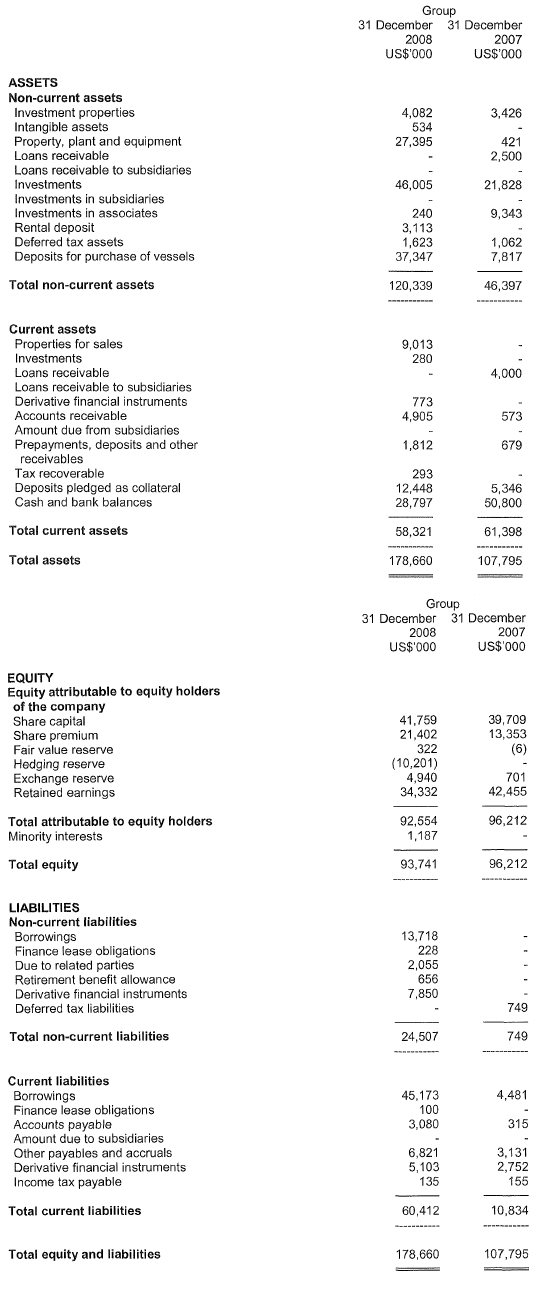FlNANClAL STATEMENTS FOR THE YEAR ENDED 31 DECEMBER 2008
Income Statement

Balanced Sheet

Click here for the complete Full Year 2008 Financials
Click here for the Third Quarter 2008 Financials
Review of Performance
Major highlights of the year
- Due to the downturn of the economy and sharp fall in asset values in 4Q08, the Group recognized revaluation1 fair value losses arising from our shipping investments and hotel and residential properties in Japan of $9.5 million. Fair value losses from our shipping investments totaled $5.5 million in 4Q08 as compared to $2.6 million in FY2008. Fair value losses from hotel and residential investments in Japan totaled $5.1 million in 4Q08 as compared to $4.3 million in FY2008.
- The last vessel held under Searex fund was disposed, capturing net gain on investment of $2.7 million and incentive fee of $1.8 million in 2Q08.
- The acquisition of the last vessel by Akebono Fund was completed during 2Q08.
- An investment in a 29,200 dwt bulk carrier was made with delivery in June 2009.
- The Group entered into five-year time charters for two newbuilds, 33,400 dwt handy size bulk carriers, with delivery in 2010 and 2011.
- Capital Advisers, engaged in hotel and residential investmenu management in Japan, has been consolidated into the Group financial statements since January 2008 after our equity ownership increased from 44.8% to 92.7%. Due to the sluggish property market, startup losses from hotel operation and fair valuation losses from investments in hotels and properties, Capital Advisers' net losses widened in 4Q08. Capital Advisers' total income, operating loss and net loss totalled $28.7 million, ($6.2 million) and ($8.3 million) respectively in FY2008.
- Capital Advisers completed a rationalization program to reduce headcount, cut overall operating expenses and limit new investments in the near term.
- Hotel Vista Kumamoto Airport, wholly owned by Capital Advisers, opened for business in January 2008.
- Hotel Vista Ebina, operated by Capital Advisers under a lease contract, opened for business in October 2008.
- Capital Adviser is the asset manager of Hotel Vista Grande Osaka, a new 304 room hotel, opened for business in November 2008.
- The average occupancy of Capital Advisers' hotels was 71% for FY2008, or on a quarterly basis, 70% in 1Q08 to 71% in 2Q08 to 75% in 3Q08 and 68% in 4Q08.
Review of income Statement
Due primarily to net losses from Capital Advisers, fair value losses from investments, higher operating expenses from the consolidation of Capital Advisers and a slowdown in finance arrangement activities, the Group recorded net losses for the year of ($3.7 million), against a net profit of $12.1 million in FY2007. Total income increased from $21.2 million in FY2007 to $40.5 million in FY2008 upon the consolidation of Capital Advisers' income from property investment1 management and hotel operations.
The Group's income is classified under fee income, hotel income, investment returns, interest income and other income. Fee income dropped by 3% from $12.0 million in FY2007 to $11.7 million in FY2008 due primarily to a drop in arrangement fee, offset by the consolidation of Capital Advisers' asset management fee income from hotel and residential projects (Refer to 1(a) NOTES [ 1 ] for breakdown of fee income). A description of the Group fee income is summarized below:
- Arrangement and agency fee refers to income for the arrangement of syndicated loans or debt financing and for the Group's agency duty in finance arrangement transactions. Finance arrangement and agency fee dropped by 68% to $2.5 million in FY2008 due to the slowdown in finance arrangement activities and the completion of fewer transactions compared to FY2007.
- Brokerage commission refers to commission from brokering ship charters on behalf of ship-owners and the income is recurrent for the duration of the charter period1 agreement. Brokerage commission totalled close to $1.3 million in FY2008.
- lncentive fee refers to the fee received when the assets managed by the Group are divested with a gain and is based on a predetermined profit sharing ratio in the event the disposal gain exceeded the hurdle rate. Incentive fee increased by 127% to $1.9 million in FY2008 due to the disposal of the last vessel under Searex.
- Asset management and administration fee is the fee for the administration and management of funds1 investments in shipping, properties and distressed assets as well as for Capital Advisers as the asset manager of hotels and residential properties in Japan. The fee of $6.0 million is recurrent until maturity of the fund1 project and increased by over three folds due primarily to maiden contribution from our hotel and property business arising from the consolidation of Capital Advisers during the year and the launch of Akebono fund.
Hotel income refers to all income related to Capital Advisers' hotel business. Capital Advisers currently owns and1 or manages 16 limited service hotels in Japan with over 2,263 rooms. The limited service hotels target the business or leisure segment. The Group recognized maiden contribution from Capital Advisers' hotel operation with income totalling close to $26.5 million. Hotel income would include hotel operator fee (fee as operator of the hotel) and all income received from hotels owned and leased by the Group. Due to the launch of three new hotels over the past 12 months, Capital Advisers experienced startup losses from its hotel operation.
Due to fair value adjustment on our investments in ships and properties in Japan, investment returns dropped from $6.8 million in FY2007 to $0.4 million in FY2008 (Refer to l a NOTES [2] for breakdown of investment returns). Major investment returns recognized in FY2008 include interest on performance notes from shipping of $5.6 million, gain on investment of $0.4 million from hotel and residential, net fair value adjustment on shipping investments and performance notes of ($2.6 million), net fair value adjustment on residential and hotel properties in Japan of ($3.7 million) and fair value adjustment of $0.4 million from office investment in China. The amount of fair value adjustment to be recognized would be highly dependent on market conditions at the time of reporting.
Employee benefits expenses grew by 176% as a result of the consolidation of Capital Advisers. Capital Advisers' staff cost represented over 76% of the Group's employee benefits expense. Other operating expenses grew by 666% due also to the consolidation of Capital Advisers. Capital Advisers' operating expenses represented over 85% of the Group's total operating expenses. Hotel leases, hotel sub-operator fee and hotel operating expenses represented close to 62% of the Group's other operating expenses.
Finance cost rose as a result of the consolidation of Capital Advisers. Contribution from our associated company dropped from $0.3 million in FY2007 to a net loss of $0.02 million in FY2008 given Capital Advisers is no longer equity accounted for and the Group recognized share of losses from Capital Advisers' associates. In summary, our net result for the year dropped from a profit of $12.1 million in FY2007 to a loss of ($3.7 million) in FY2008.
Commentary
The shipping and financial services sectors have taken a hard hit by the downturn of the global economy. Since the second half of the year, banks have tightened credit and cost of funding has increased substantially. Under the current credit crunch environment where financing is not freely available, the Group's structured finance arrangement business will continue to suffer until market conditions improve or when banks relax their credit and resume their lending activities.In terms of the Group's Maritime Investment1 management operation, the charter hire and the value of product tankers remained stable. The charter hire and value of container vessels, however, continued to be placed under downward pressure from the decline in freight rate resulting from the drop in cargo traffic. The container market remains under the pressures of a prolonged slowdown in trade activities and reduced demand for cargo traffic. The charterhire and value of bulk carriers declined substantially since the second half of the year. As a benchmark, the Baltic dry index (BDIY) fell by close to 92% from 9,589 points as at 30 June 2008 to 773 points as at 2 January 2009. Noteworthy is that the BDIY is a composite of Baltic Capesize, Panamax, Handysize and Supramax indices, covering a wide scope of bulk carriers, while the Group invests only in the smaller sized handy bulk carriers. Since year end, the BDlY has recovered by 157% to 1,989 points as at 12 February 2009 but as shipping transport is closely linked to global economic activities, the shipping market will be directly impacted by the global recession. While the Group realized a drop in the fair value of our vessels in FY2008, in the event the downturn continues, the fair value of our shipping investments may be further impaired.
The Group has a wholly-owned investment in a 4,300 TEU container vessel which was delivered in January 2009 and financed partly by Japanese Yen borrowings. The USD-Yen forward currency contract has been exercised on delivery of the vessel and any subsequent gain or loss from the yen loan will be charged directly to the income statement. Meanwhile, the Japanese Yen has strengthened significantly in the last quarter. In view of the Group's Yen borrowings, a strong yen would result in foreign exchange translation losses for the Group.
The Group has direct and indirect investments in 14 vessels, six of which have not been delivered. With the exception of two new buildings including a product tanker to be delivered in the 2010 and a bulk carrier to be delivered in 2012, the Group has secured employment for all 12 vessels. The charter period of these 12 vessels will expire between the fourth quarter of 2009 and 2018. Our current charter contracts have locked a higher charter rate as compared to the prevailing low market rates.
The property market in Guangzhou where the Group invested has corrected and leveled off in the last quarter. The prime office project (Tianhe district) we invested is fully leased out and has yet succumbed to any major market corrections. The Group's fair value adjustment on office properties in China is dependent on the outlook of the office market in the Tianhe district and the direction of the RMB.
In terms of the Group's property investment1 management in Japan, the tight credit policy of financial institutions prevailed in Japan and property value continued to drop. The company recognized fair valuation losses in the financial statement in FY2008. Should the property market continue to deteriorate, the fair value of the Group's investment in Japan properties may be further impaired.
A growing number of property companies, especially property asset management companies in Japan went out of business due to the extraordinary tight credit crunch in Japan. The Group has taken advantage of this opportunity to increase the volume of property assets under management and by utilizing the Group's expertise to take over the role of the asset manager, which would result in increased recurrent fee income for the Group.
The Group's focus on budget and limited service hotel for domestic business travelers and foreign budgeted tourists makes it less dependent on foreign tourist and more resilient to the current economic situation. The Group intends to increase the number of hotels under management, increase overall occupancy rates for the hotels and to build the 'Hotel Vista' brand. The Group also plans to open new hotels in Kyoto and Fukuoka in 2009 which would increase the number of hotels under the "Hotel Vista" brandname to fourteen.